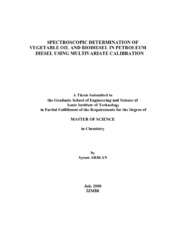Please use this identifier to cite or link to this item:
https://hdl.handle.net/11147/3767Full metadata record
| DC Field | Value | Language |
|---|---|---|
| dc.contributor.advisor | Özdemir, Durmuş | - |
| dc.contributor.author | Arıkan, Aysun | - |
| dc.date.accessioned | 2014-07-22T13:52:19Z | - |
| dc.date.available | 2014-07-22T13:52:19Z | - |
| dc.date.issued | 2008 | - |
| dc.identifier.uri | http://hdl.handle.net/11147/3767 | - |
| dc.description | Thesis (Master)--İzmir Institute of Technology, Chemistry, İzmir, 2008 | en_US |
| dc.description | Includes bibliographical references (leaves: 79-84) | en_US |
| dc.description | Text in English; Abstract: Turkish and English | en_US |
| dc.description | xii, 84 leaves | en_US |
| dc.description.abstract | Due to the limited petroleum reserves and pollutant effect of petroleum fuels, the use of alternative fuels has became important in recent years. Diesel is one of the most used petroleum fuel, whose exhaust emissions composed of harmful particles, that pollutes the environment. In this sense, vegetable oils and their esters (biodiesel) are considered environmentally friendly fuels, which reduce hazardous impact of diesel emissions. However, using vegetable oils directly in diesel engines may cause some engine problems due to their high viscosity. The most commonly used way to reduce their viscosity is the converting into biodiesel. Because biodiesel production is expensive and time consuming, diesel may be illegally adulterated with vegetable oils before converting into biodiesel.Diesel may also adulterated with kerosene due to the large price differences. The main impact of this adulteration is increased emissions, which damage the environment. On the other hand, the addition of kerosene may also damage the engine. Because of these reasons, it is important to determine these adulterants illegally present in petroleum diesel. In this study, we have determined the adulteration of diesel with sunflower, canola oil, used frying oil, kerosene, and biodiesel by different molecular spectroscopic techniques combined to genetic inverse least squares (GILS). The results showed that the GILS method is suitable in the fast determination of diesel adulteration with vegetable oils, used frying oil, kerosene, and biodiesel when combined to NIR, FTIR-ATR, and molecular spectroscopic techniques. | en_US |
| dc.language.iso | en | en_US |
| dc.publisher | Izmir Institute of Technology | en_US |
| dc.rights | info:eu-repo/semantics/openAccess | en_US |
| dc.subject.lcc | QD96.M65 A721 2008 | en |
| dc.subject.lcsh | Molecular spectroscopy | en |
| dc.subject.lcsh | Diesel fuels--Analysis | en |
| dc.subject.lcsh | Biodiesel fuels | en |
| dc.title | Spectroscopic Determination of Vegetable Oiland Biodiesel in Petroleum Diesel Using Mulitivariate Calibration | en_US |
| dc.type | Master Thesis | en_US |
| dc.institutionauthor | Arıkan, Aysun | - |
| dc.department | Thesis (Master)--İzmir Institute of Technology, Chemistry | en_US |
| dc.relation.publicationcategory | Tez | en_US |
| dc.identifier.wosquality | N/A | - |
| dc.identifier.scopusquality | N/A | - |
| item.openairecristype | http://purl.org/coar/resource_type/c_18cf | - |
| item.languageiso639-1 | en | - |
| item.openairetype | Master Thesis | - |
| item.grantfulltext | open | - |
| item.fulltext | With Fulltext | - |
| item.cerifentitytype | Publications | - |
| Appears in Collections: | Master Degree / Yüksek Lisans Tezleri Sürdürülebilir Yeşil Kampüs Koleksiyonu / Sustainable Green Campus Collection | |
Files in This Item:
| File | Description | Size | Format | |
|---|---|---|---|---|
| T000676.pdf | MasterThesis | 991.27 kB | Adobe PDF |  View/Open |
CORE Recommender
Page view(s)
164
checked on Mar 31, 2025
Download(s)
44
checked on Mar 31, 2025
Google ScholarTM
Check
Items in GCRIS Repository are protected by copyright, with all rights reserved, unless otherwise indicated.